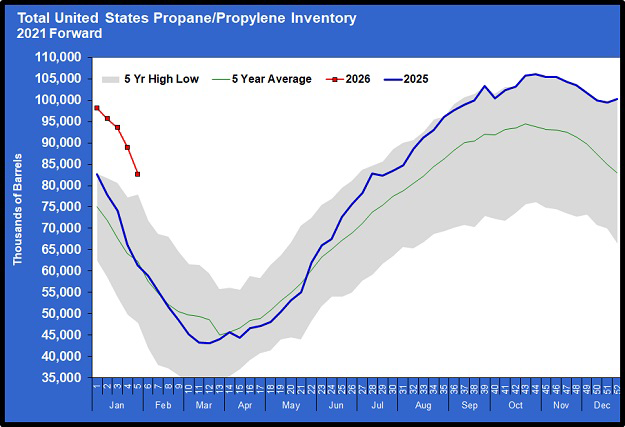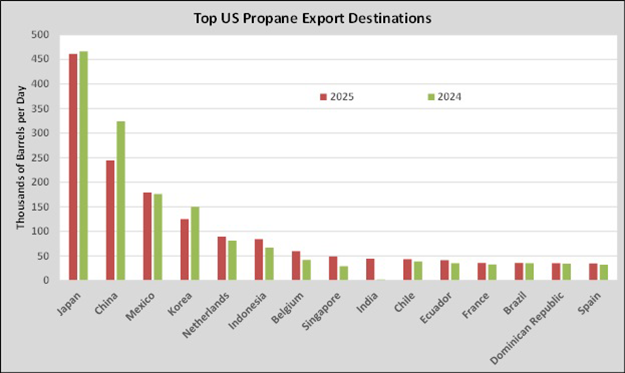Grants, shake-ups and the trajectory of the Trump administration
Potential opportunities for propane
The early months of the second Trump administration have ushered in a deliberate restructuring of federal leadership, with appointments and notable vacancies across key agencies shaping the future of grants, regulations and economic strategy.
While some departments remain in flux, early appointments suggest a shift toward targeted economic growth, reindustrialization and streamlined federal support mechanisms that may benefit industries like propane and other clean fuels.
The selection of seasoned figures such as Stuart Levenbach at the Office of Management and Budget (OMB) and Michael Kratsios at the Office of Science and Technology Policy (OSTP) signals a renewed emphasis on science, innovation and energy-related grantmaking and an intent to reduce bureaucratic barriers to align public funding with economic growth. Conversely, the conspicuous absence of leadership in rural development and transportation raises concerns about the pace of grant deployment in sectors dependent on federal coordination, particularly in agriculture and infrastructure. Yet, these gaps may reflect a broader strategy to consolidate or redefine federal priorities rather than a lack of attention from the White House.
Overall, the current leadership landscape suggests a federal grant environment that will prioritize hard infrastructure, energy independence and technical workforce expansion over the next four years. The reorientation of agency goals away from social and climate ideologies – combined with new leadership that understands how to leverage federal funds for domestic advantage – could lead to renewed opportunities for grant seekers in industries like propane. The groundwork is being laid for expanded engagement across energy, trade, workforce and education channels, and propane representatives large and small should be ready to act.
Takeaways
As the Trump administration continues to build out its leadership across federal agencies, the direction of grantmaking and regulatory policy is coming into sharper focus.
A pattern is emerging – one that favors pragmatic investment in infrastructure, energy and workforce development. With strategic figures now installed in key roles at OMB, OSTP, the U.S. Department of Agriculture (USDA), Interior and the Department of Energy (DOE), there is clear momentum and willingness toward funding opportunities that reward domestic economic growth, technological progress and energy self-sufficiency over the long term.
At the same time, vacancies across vital agencies such as the Department of Transportation (DOT) and USDA’s Rural Development signal both a challenge and an opportunity. While the absence of permanent leadership may slow certain initiatives in the near term, it presents a chance to reset program priorities and introduce ideas for grant programs better aligned to benefit the American economy and export market. For the propane industry and other fuel sectors, this evolving landscape presents a rare moment to shape the conversation, influence policy and prepare for a surge in capital and assistance programs that support the Trump administration’s goals and the needs of everyday Americans. The window for positive influencing is open across federal, state and non-governmental levels, but it will not remain so indefinitely. Take action now to educate your representatives and administrators about the benefits and economic potential of American propane.
For a deeper dive, see the below summaries, by office, of propane-related federal leaders and their roles in the new administration.
I. Office of Management and Budget (OMB) and Regulatory Oversight
OMB is directly administered from within the executive office of the White House, tasked with producing and monitoring the executive budget and examining all agency programs, policies and procedures for compliance with the president’s policies. Within OMB, several offices play critical roles in shaping policy relevant to federal procurement, regulatory guidance and resource oversight – managing interagency activities and strategy. Currently, OMB at large lacks several key associate directors, which could indicate that these offices may be restructured, reduced or consolidated over the course of the second Trump administration.
The Office of Federal Procurement Policy is tasked with providing guidance and oversight for federal procurement efforts, covering a wide scope that includes agency-engaged contracts, solicitations and broad agreement structures such as grants. Although the office currently lacks a Senate-confirmed executive, it remains pivotal. President Trump’s directive to implement a Revolutionary Federal Acquisition Regulations Overhaul is designed to simplify the federal bidding process, particularly for smaller firms, and aims to demonopolize the contractor landscape, which may open new opportunities. This is especially beneficial for industries such as propane, dominated by small businesses, which provide fuel to a host of federal properties and assets but have been unable to compete with large firms with teams of legal experts capable of navigating the regulatory landscape.
Meanwhile, President Trump has appointed Levenbach to associate director of the Office of Natural Resources, Energy, Science and Water Programs. This office oversees critical alignment of policy programs and regulatory efforts across major agencies such as Interior, Energy and Transportation. Levenbach previously served the first Trump administration as chief of staff at the National Oceanic and Atmospheric Administration (NOAA), and before that he spent 10 years at OMB as a program examiner and policy analyst within various natural resources-focused offices. Since 2021, Levenbach served as director for government affairs and public policy for the Americas region at the energy technology company Baker Hughes, leveraging grant and other funding opportunities for private-sector clients.
Levenbach understands the importance of grants and their downstream contributions to the economy. With the president’s focus on American energy extraction, export and free use domestically, this is a great step to powering the coming American economic boom promised during the 2024 campaign. Additionally, Levenbach’s background in NOAA and his Ph.D. in marine ecology shows a deep understanding of the fragility of marine ecosystems. If he isn’t already aware of the tremendous reductions in pollutions transitioning from diesel- to propane-fuel systems, then he’ll learn quickly and could become an advocate for marine propane transport and shipping fuel transition efforts across relevant agencies.
II. Science, innovation and technology leadership
Kratsios has been appointed assistant to the president and director of the White House Office of Science and Technology Policy (OSTP), a position tasked with advising the president about the scientific, engineering and technological aspects of national policy and the work of the executive branch. President Trump issued a public-facing letter soon after the appointment charging Kratsios with forging strong ties between government, industry and academia to advance research and development, strengthen domestic supply chains and spur robust private sector investment. The letter called for the dismantling of regulatory barriers and for building an ecosystem that celebrates merit, protects American intellectual leadership and frees scientists from administrative burdens.
On April 14, at the Endless Frontiers Retreat, Kratsios emphasized the critical role of federal funding in bridging technological divides. Kratsios articulated a three-part strategy: to creatively allocate federal R&D dollars, establish a common-sense regulatory regime that supports innovation and to fully embrace and export American-built tools and products. He openly contrasted the Biden administration’s DEI and anti-carbon focus with its alleged aims to advance economic and scientific strength. Kratsios’ remarks signal a new era of federal investment in economically advantageous research and industrial development over social and ideological programs across federal agencies, aligning his mission with the administration’s broader agenda to refocus science policy around tangible economic and industrial returns.
Kratsios’ leadership signals a strong opportunity for expanded federal support of transitional fuels like propane and research initiatives that prioritize cost-effective, scalable solutions to domestic energy and technology needs. By redirecting OSTP’s power toward economic growth, infrastructure and applied innovation, Kratsios is positioned to play a key role in rebuilding America’s technological edge – anchored in merit, investment and pro-growth policy.
III. U.S. trade, agriculture and rural development
Ambassador Jamieson Greer’s appointment as U.S. trade representative (USTR) signals a renewed focus on advancing American energy exports, including propane, particularly in East Asian markets. Greer – who recently received a notable endorsement from Growth Energy, the largest biofuels advocacy organization – alongside strategic actions undertaken by the Treasury Department in negotiations with Chinese and Asian partners, points to a coordinated effort to strengthen U.S. energy and agricultural exports. Greer is expected to play a critical role in discussions with major propane-importing countries, potentially unlocking new opportunities for industrial and agricultural applications of American propane.
At the U.S. Department of Agriculture (USDA), Secretary Brooke Rollins has moved quickly in her early tenure, yet numerous leadership roles remain unfilled – many of them essential to advancing agricultural support sectors. Most notably, the under secretary for Rural Development (US-RD) seat remains vacant, echoing the first Trump administration’s trend of leaving this critical office open for prolonged periods. The US-RD is tasked with identifying and addressing emerging rural challenges through strategic deployment of grant programs and partnerships, particularly in areas such as energy, housing, infrastructure and emergency services. Bette Brand, who previously served in this role and now leads rural development financing firm Strategic Consulting LLC, could be a strong shoe-in if the administration decides to prioritize this vacancy.
Equally important are the 46 state director roles within Rural Development that remain unfilled. These positions are vital to link federal resources with local agribusinesses and propane consumers, offering a direct pipeline for federal program implementation and industry engagement. Likewise, the lack of permanent leadership in the Rural Utilities Service and the Rural Business Cooperative Service continues to delay key support initiatives. Given propane’s critical role in farming operations – powering crop dryers, equipment and homesteads – filling these vacancies is a priority.
Scott Hutchins’ return to USDA as under secretary for Research, Education and Economics is a positive sign for the renewable fuels sector. His leadership will oversee major agencies such as the Agricultural Research Service and National Institute of Food and Agriculture – institutions with direct links to research and development of biofuels, including renewable propane. Similarly, Bill Beam’s appointment as administrator of the Farm Service Agency brings continuity to the agency’s key grant and assistance programs, which support struggling farmers and exporters alike.
However, grant opportunities within USDA are slated for restructuring in line with the Trump administration’s broader policy shift away from identity-based programs that excluded huge swaths of U.S. farmers. Altogether, the staffing and programmatic decisions at USTR and USDA under the new administration signal a favorable environment for rural America, agriculture and support industries like propane – so long as leadership roles are swiftly filled and aligned with the Trump administration’s pro-growth, America-first agenda.
IV. Domestic energy, infrastructure and workforce development
At the Department of Energy (DOE), the appointment of Derek Passarelli as principal deputy under secretary for Science & Innovation presents a strong opportunity for advancing propane and related energy technologies. Passarelli previously led the Golden Field Office, which manages grants and contracts supporting renewable energy projects and oversees the National Renewable Energy Laboratory, the nation’s only lab focused solely on clean energy and energy efficiency research and development. With oversight of nearly $15 billion in activities across DOE’s Office of Science, Applied Energy Programs and 13 national laboratories, Passarelli is well suited to support the development of clean, efficient technologies for vehicle fleets, rural communities and industrial use, reinforcing propane’s role in the administration’s broader domestic energy independence agenda.
At the Department of the Interior, Secretary Doug Bergum is executing a sweeping restructuring effort under Order No. 3429, consolidating offices and preparing for significant workforce reductions through 2025. Assistant Secretary Tyler Hassen has been charged with implementing the administration’s directives for streamlining operations and enhancing efficiency. While these changes limit the likelihood of new grant programs emerging from Interior in the short term, the restructuring sets the stage for a leaner, more targeted agency capable of supporting domestic energy development. Secretary Bergum’s work advancing American energy extraction and export efforts suggests that, following reorganization, new programs could emerge – particularly those aimed at supporting small and mid-sized energy companies and the energy-export market.
At the Department of Labor, existing programs show promise, but more work will be needed to educate future leadership on the economic potential of grant activity. The Workforce Opportunities for Rural Communities grant program, for example, proved a valuable funding source in Appalachia, the rural South and the Mountain West during the last two administrations. With renewed demand for skilled workers in the transportation and energy sectors, the department could retool these grants to meet rising labor needs in strategic industries. In particular, the department’s International Labor Affairs budget for grants could be redirected to help American companies grow their domestic footprint or build export capacity – especially in alignment with State Department trade initiatives across the Western Hemisphere. Meanwhile, Occupational Safety and Health Administration grant programs are expected to remain in place due to their longstanding necessity. However, their focus will likely shift toward new economic priorities, including workforce training and safety in expanding fields like high-tech manufacturing, industrial production, mining and energy.
At the Department of Transportation (DOT), Secretary Sean Duffy has made progress reversing anti-carbon regulations from the previous administration, yet key leadership positions remain vacant across the department’s major operating administrations – including the Federal Highway Administration, the Pipeline and Hazardous Materials Safety Administration, the Federal Motor Carrier Safety Administration, Federal Railroad Administration and the Maritime Administration. These offices administered billions in grants under the Biden administration and now face an opportunity to realign funding priorities to support vital infrastructure and workforce development without ideological constraints such as Justice40 or EV mandates. The reopening of programs like Port Infrastructure Development, Hazardous Materials Safety Instructor Training and the Turner-Fairbank Highway Research Center projects could once again serve as engines of economic growth and job creation.
Additionally, the DOT and the Federal Maritime Commission (FMC) face calls to revitalize America’s maritime economy, while the Jones Act poses cost challenges to coastal cabotage shipping – evident in regions like New England where importing propane from Qatar or Canada is more cost-effective than shipping from the American Gulf. By investing in American shipbuilding, workforce training and coastal infrastructure, DOT and FMC can restore economic balance, increase energy affordability and build lasting national resilience while adhering to the administration’s stance on the Jones Act.
V. Education and workforce preparation
At the Department of Education, Secretary Linda McMahon has made it clear that her long-term goal is to significantly reduce – if not ultimately eliminate – the department she now leads. However, several key grant and support offices remain that could benefit the future of American employment preparation. In particular, the Office of Discretionary Grants & Support Services and the Office of Formula Grants and Program Support Services have historically concentrated on grants to support colleges, charter schools, the arts and humanities. But under the current administration, these same funds could be redirected to bolster trade schools, industrial and machinery training, apprenticeships and technical skill development. These offices oversaw $2.1 billion in annual grants under the previous administration, and with proper guidance, this funding can be adapted to meet the evolving needs of American industry. This pivot would directly benefit sectors expected to expand over the next four years, particularly in energy. For the propane industry specifically, such a shift would present a major opportunity to build a stronger pipeline of domestic talent – especially in critical roles such as bobtail drivers, plant operators and maintenance technicians. As the need for skilled labor rises alongside infrastructure investment and energy distribution, redirecting educational grants to support trade and technical training would deliver long-term economic value and job security for working-class Americans. Reinvesting in youth and early-career trade education not only aligns with the administration’s stated commitment to economic growth but also offers a powerful counterbalance to calls for increased immigration.
Nicholas Edward is the manager of grants and agency engagement for the National Propane Gas Association. For more information, contact nedward@npga.org.
















